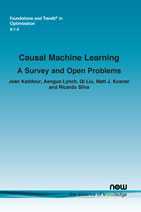Causal Machine Learning: A Survey and Open Problems
By Jean Kaddour, UCL, UK, jean.kaddour.20@ucl.ac.uk | Aengus Lynch, UCL, UK, aengus.lynch.17@ucl.ac.uk | Qi Liu, University of Hong Kong, Hong Kong, liuqi@cs.hku.hk | Matt J. Kusner, École Polytechnique de Montréal, Canada and Mila - Québec AI Institute, Canada, matt.kusner@mila.quebec | Ricardo Silva, UCL, UK, ricardo.silva@ucl.ac.uk
Abstract
Causal Machine Learning (CausalML) is an umbrella term for machine learning methods that formalize the datageneration process as a causal model. This perspective enables one to reason about the effects of changes to this process (interventions) and what would have happened in hindsight (counterfactuals). We categorize work in CausalML into five groups according to the problems they address: (1) causal supervised learning, (2) causal generative modeling, (3) causal explanations, (4) causal fairness, and (5) causal reinforcement learning. We systematically compare approaches in each category and point out open problems. Further, we review field-specific applications in computer vision, natural language processing, and graph representation learning. Finally, we provide an overview of causal benchmarks and a discussion of the state of this nascent field, including recommendations for future work.
Causal Machine Learning: A Survey and Open Problems
Causal Machine Learning (CausalML) is an umbrella term for machine learning methods that formalize the data generation process as a causal model. This perspective enables one to reason about the effects of changes to this process (interventions) and what would have happened in hindsight (counterfactuals). CausalML can be categorized into five groups according to the problems they address, namely (1) causal supervised learning, (2) causal generative modeling, (3) causal explanations, (4) causal fairness, and (5) causal reinforcement learning.
In this monograph, approaches in the five categories of CausalML are systematically compared, and open problems are identified. The field-specific applications in computer vision, natural language processing, and graph representation learning are reviewed. Further, an overview of causal benchmarks is provided, as well as a discussion of the state of this nascent field, including recommendations for future work.
